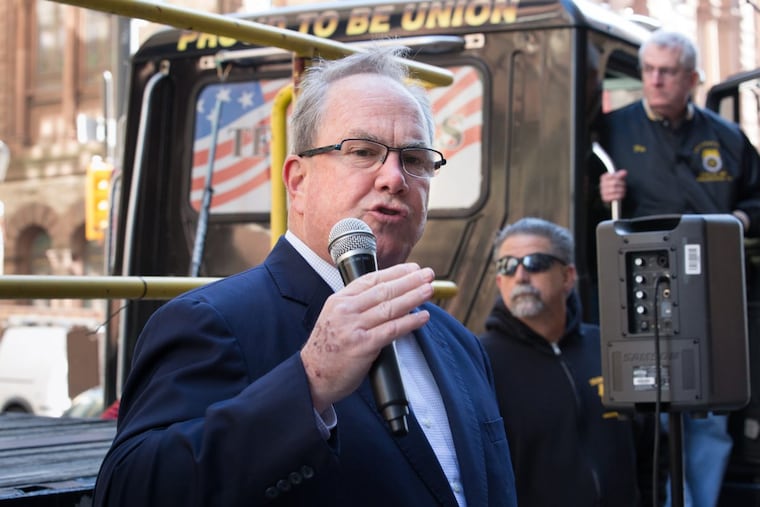Philly's most powerful Republican, John Taylor, is retiring
He has represented Philadelphia's 177th District for 17 two-year terms, decided to not seek reelection next year. The former local Republican Party chairman cited the rise of political polarization as one reason.

Walter F. Mondale lost his bid to deny then-President Ronald Reagan a second term in 1984, the same year Apple started selling the Macintosh computer and the nation chuckled at an older lady in a Wendy's commercial demanding to know, "Where's the beef?"
Down low on that year's general election ticket, a Philadelphia political legend was being born.
John Taylor, a 29-year-old lifelong Democrat who had switched to Republican the year before, was working the river wards with a crew of young volunteers, seeking to bump off a four-term Democrat in the state House's 177th District.
Taylor defeated Rep. Gerald McMonagle by 3,000 votes, the first of 17 terms he would win in the district. But there will not be an 18th election for Taylor, who turned 62 in April.
With the 2018 primary election more than eight months away, Taylor said he had decided against seeking reelection, even though he is confident he could win again in a district where Republicans have been in the minority for his entire career.
"It sounds like a cliche, but spending time with family is a thing. They sacrifice enough," said Taylor, explaining his exit from elected office, "I'd just love to see some gap between my legislative career and death."
Taylor, a ward leader who served as chairman of the local Republican Party, said he planned to remain involved in politics.
"It's not the end of my political career," he said. "It's just the end of my elective career."
Mayor Kenney, a Democrat, called Taylor's decision a loss for the city. He cited Taylor's work on state funding for mass transit and the Port of Philadelphia as key contributions, noting Taylor's emergence decades ago from a group of Republicans with ties to labor unions.
"Those guys were always very moderate, very reasonable," Kenney said. "They have that blue-collar ethic that makes them a joy to work with."
Taylor said his 17 victories were about constituent service, building a reputation for helping residents, and working well with neighboring Democratic officials.
"I think the district, historically, has been a little more conservative than the registration would reflect," Taylor said. "We weren't perceived as being right-wing zealots or anything."
Political polarization is not just a national phenomenon. Taylor confronts it every day.
Voters in Philadelphia hold him accountable for positions taken by President Trump and State Rep. Daryl Metcalfe, a Butler County Republican known for staking out some of the most conservative stances in Harrisburg. And conservative colleagues look down on his moderate views.
"I'm less and less able to run on my own record as opposed to trying to defeat labels, and answer what is happening in Washington and answer for what Daryl Metcalfe is doing," Taylor said. "We're ridiculed at home for being a right-wing nut, and I drive 100 miles to Harrisburg, and I'm ridiculed for being a socialist. Your self-esteem gets damaged."
Taylor never used the culture-war tactics popular with candidates on the far left and right of the political spectrum.
Raised in Kensington, Taylor graduated from Northeast Catholic High School. He worked in Acme Markets warehouses as a shop steward for the Teamsters union to save money for college. He started at West Chester University and then graduated from the University of Central Florida.
He worked as a law clerk in a Philadelphia firm while attending evening law school classes at Temple University. Taylor is now of counsel at Archer & Greiner.
Taylor got involved in local politics by working on the mayoral campaign of John Egan, a Republican who lost the 1983 general election.
Taylor lived in Port Richmond when he was first elected. The borders of the 177th District have shifted in legislative reapportionment over the decades, moving east toward the Delaware River.
An appendage on the district's western edge now stretches out to include Taylor's current home in the Northwood section of lower Northeast Philadelphia.
Taylor acknowledges that gerrymandering, drawing lines for political advantage, made that happen. He noted that the same practice took Latino voters from his district, sending them to Democratic strongholds next door.
The 177th District was 80 percent white in 2012, the last time the borders were redrawn.
Taylor won his 17th term in November, defeating the Democratic nominee with 55 percent of the vote. He was unopposed in the 2014 general election and defeated a Democrat in 2012 with 57 percent of the vote.
Taylor was Philadelphia's lone Republican representative until Martina White won a special election in March 2015 for Northeast Philadelphia's 170th District and held the seat in last year's general election.
Michael Meehan, who became chairman of the Republican City Committee in April, said Taylor was critical in securing state funding for the Convention Center, professional sports stadiums, and other major city projects.
"He's done his time, and he's served the city well," Meehan said.
Taylor was the consensus pick in 2013 to be chairman of the Republican City Committee. His primary task was to put an end to a civil war in the party between the old guard who cooperated with Democrats on patronage and other political matters and a group that called itself the "Loyal Opposition" that wanted to be more competitive in elections. Taylor held the post until 2016 and was credited with calming for a time the rival factions in his party.
Vito Canuso, the old-guard chairman who stepped down when Taylor was elected, called him a "utility player" for the local party who helped the Democratic-controlled city in the Republican-controlled General Assembly.
"He was the go-to guy for Philadelphia," Canuso said. "I can understand. He's seen a lot of changes in Harrisburg."